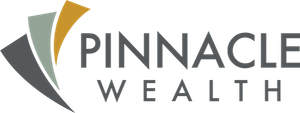By Nik Aamlid, CAP®, Wealth Advisor
If you’re like millions of Americans, it’s very likely that upon hearing the phrase “student loans”, you become a little on edge, and even start to sweat a little.
It’s a pretty common reaction, I promise.
In fact, the heavy load of student loans is all too common in our country. Americans now owe about $1.5 trillion, with student loan debt now surpassing credit card debt.
With so many people saddled with student debt, we wanted to take some time to break down everything you need to know.
Whether you owe a little or a lot, our team at Pinnacle Wealth is here to help you reach your True Wealth. And in our experience, that means defeating the beast of student loans.
So let’s jump in to some common questions about student debt, and talk about tips for students who are anticipating loans, and those who already have them.
STUDENTS BORROW TOO MUCH
First, let’s talk about what’s most common.
The most common phenomenon we see is that students often borrow too much money.
It’s important to remember this same principle that applies to mortgages and other debts; just because the bank will approve it, does not mean that’s how much you should borrow.
So before signing a loan, do the math. Borrow only what you need to pay college bills.
Don’t fall into the trap of using loan money to fund extravagant spring break trips, shopping sprees, or even every day expenses. These are tempting bonuses, but college is only four years, and debt can hang around a lot longer.
PAY MORE THAN THE MINIMUMS
And if you’ve already completed your education, it’s time to understand a
key component toward payback — do not choose the lowest monthly payment option if you can afford more.
Federal loans offer various pay-back options, some with very low monthly payments.
However, this extends the amount of time it takes to pay back the loan, and you’ll end up paying more in interest and holding the debt for longer.
If you can pay more, it’s wise to do so!
TAKE ADVANTAGE OF PAYMENT PAUSE
Additionally, this principle also applies to postponing payments.
For example, federal student loans are in a “student loan payment pause”.
Too many have stopped paying on their loans during the payment pause .
Just because you don’t have to pay, doesn’t mean you can’t pay.
If you are able to still pay towards your loans, take advantage of the opportunity to do so while not accruing interest. The faster your repayment process, the less interest you’ll pay over the life of your loan.
MANAGE DEBT WITH A PLAN
Next, let’s talk about managing your debt.
For many of us, getting an education without any debt is out of reach, so it’s best to learn to manage the debt responsibly.
If you’re a student planning to attend college, have a plan. If college is something you are serious about, it’s something that should be planned for.
At this point, the hefty cost of education should come as no surprise, so here are some additional tips to make sure you stay ahead of the eight ball.
- Utilize a strategic, education-specific savings vehicle on the front end to help cover some costs. There are options such as 529’s, or Coverdell Education Savings Accounts. Any funds placed in these accounts grow tax deferred. Plus, as long as it’s being used for education it can be taken out tax-free.
- Roth IRA’s are another savings option. These can also be used to fund education tax-free, but it is wise to consider retirement plans and not derailing those first.
- Be smart about your choice of institution. Choose a school where the costs will align with the career you are hoping to get afterwards. Maybe a private education isn’t the best choice if you are hoping to get into a career that would make it hard to pay back those loans.
- Don’t get lazy in looking for scholarship opportunities. Millions in scholarships go unclaimed each year. Remember, any little bit can help!
- Work during school to counter balance some of your daily expenses. A nominal part-time job during school can help offset many of the daily expenses that occur during young adulthood. It may not feel like a lot, but earning money along the way can make a huge difference over four years, especially once interest rates are considered.
And if your college days are behind you, but you still need to know how to manage debt, have a plan!
Very few people (an estimated 3%) actually write down goals. We would encourage you to write down a specific goal for when you would like to have your debt paid off.
Studies show that you are 42% more likely to achieve a goal if you write it down (Source: Inc.com)
Make a monthly budget and pay as much toward your loans as you can manage.
Even if your loans are in deferment, attack the principle!
If they have been purchased and you have multiple different loans at different interest rates, try to get the high interest rate loans paid off first, then move onto the next.
After debt is managed, you may be interested in continuing the financial momentum to begin investing.
It’s very common for people to ask, is it still possible to invest in my future while paying off loans?
Absolutely!
One mistake people make is thinking this is an all or nothing question—either applying every penny toward debt, or every penny toward investments.
Every situation is different, but for most people, balance works.
For example, if you have a job that will match 401k contributions, take advantage of that match,then focus on paying off debt.
Mathematically, there’s a case to be made for paying minimums on loans and investing the remainder, but many of those formulas do not account for inherent risk in the markets.
Our team believes the best approach to debt vs. investing is typically a balanced one, but a balance than skews toward attacking the debt.
STUDENT LOANS ARE DIFFERENT THAN OTHER
DEBT
The last thing we want to address about student loans is how student debt differs from other kinds of debt.
A key difference is that student loans are what we consider not secured loans. This means that if a debtor defaults, the lender can not re-possess any assets to cover the debts.
Lenders can’t do anything with your paper degrees.
This makes the loan a higher risk.
However, even though it is higher risk, student loan debt is often considered “good debt.” Most likely the reason you have it was to set yourself up for future success, as an investment in your future.(Similar to the way home loans can be viewed, in some ways).
Examples of “bad debt” include credit cards, auto loans, or payday loans.
Another important thing to remember when paying back student loan debt is that if you have federal loans, you can deduct the interest paid on your taxes (again, similar to homes). This can be a tax benefit for those paying loans.
SUMMARY
In short, student debt plays a massive role in today’s world and the pressing implications on the economy.
If you find yourself with student loans, follow these simple rules:
- Understand your debt load.
- Develop a plan.
- Be diligent to your plan and get your loans paid off.
The future version of yourself is already thanking you.


